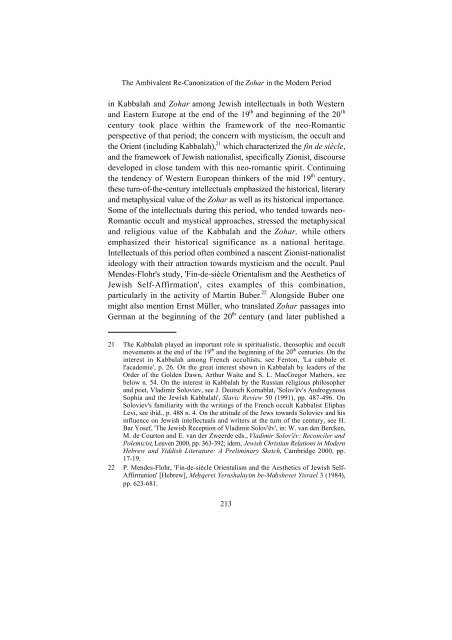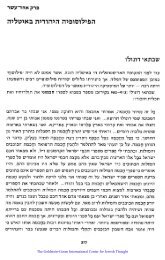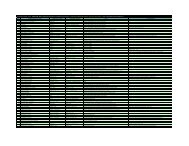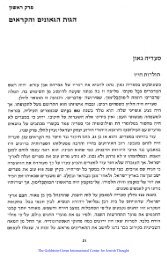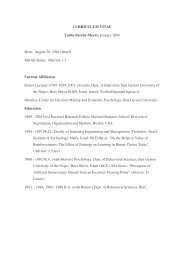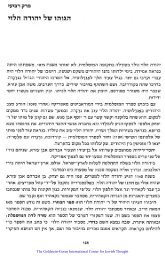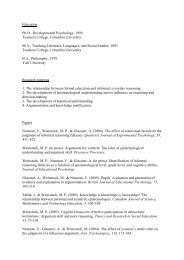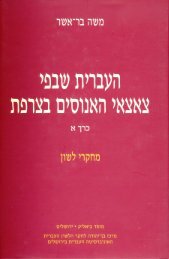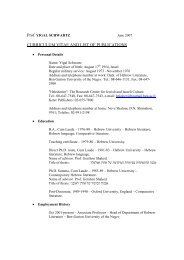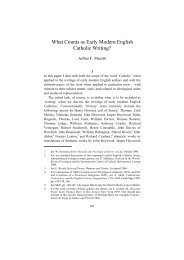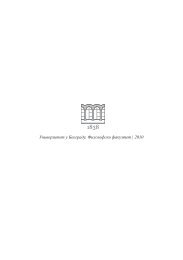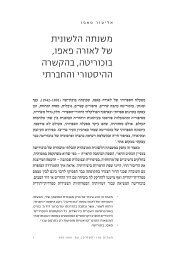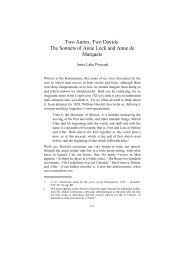Admiration and Disgust: The Ambivalent Re-Canonization of the ...
Admiration and Disgust: The Ambivalent Re-Canonization of the ...
Admiration and Disgust: The Ambivalent Re-Canonization of the ...
Create successful ePaper yourself
Turn your PDF publications into a flip-book with our unique Google optimized e-Paper software.
<strong>The</strong> <strong>Ambivalent</strong> <strong>Re</strong>-<strong>Canonization</strong> <strong>of</strong> <strong>the</strong> Zohar in <strong>the</strong> Modern Period<br />
in Kabbalah <strong>and</strong> Zohar among Jewish intellectuals in both Western<br />
<strong>and</strong> Eastern Europe at <strong>the</strong> end <strong>of</strong> <strong>the</strong> 19 th <strong>and</strong> beginning <strong>of</strong> <strong>the</strong> 20 th<br />
century took place within <strong>the</strong> framework <strong>of</strong> <strong>the</strong> neo-Romantic<br />
perspective <strong>of</strong> that period; <strong>the</strong> concern with mysticism, <strong>the</strong> occult <strong>and</strong><br />
<strong>the</strong> Orient (including Kabbalah), 21 which characterized <strong>the</strong> fin de siècle,<br />
<strong>and</strong> <strong>the</strong> framework <strong>of</strong> Jewish nationalist, specifically Zionist, discourse<br />
developed in close t<strong>and</strong>em with this neo-romantic spirit. Continuing<br />
<strong>the</strong> tendency <strong>of</strong> Western European thinkers <strong>of</strong> <strong>the</strong> mid 19 th century,<br />
<strong>the</strong>se turn-<strong>of</strong>-<strong>the</strong>-century intellectuals emphasized <strong>the</strong> historical, literary<br />
<strong>and</strong> metaphysical value <strong>of</strong> <strong>the</strong> Zohar as well as its historical importance.<br />
Some <strong>of</strong> <strong>the</strong> intellectuals during this period, who tended towards neo-<br />
Romantic occult <strong>and</strong> mystical approaches, stressed <strong>the</strong> metaphysical<br />
<strong>and</strong> religious value <strong>of</strong> <strong>the</strong> Kabbalah <strong>and</strong> <strong>the</strong> Zohar, while o<strong>the</strong>rs<br />
emphasized <strong>the</strong>ir historical significance as a national heritage.<br />
Intellectuals <strong>of</strong> this period <strong>of</strong>ten combined a nascent Zionist-nationalist<br />
ideology with <strong>the</strong>ir attraction towards mysticism <strong>and</strong> <strong>the</strong> occult. Paul<br />
Mendes-Flohr's study, 'Fin-de-siècle Orientalism <strong>and</strong> <strong>the</strong> Aes<strong>the</strong>tics <strong>of</strong><br />
Jewish Self-Affirmation', cites examples <strong>of</strong> this combination,<br />
particularly in <strong>the</strong> activity <strong>of</strong> Martin Buber. 22 Alongside Buber one<br />
might also mention Ernst Müller, who translated Zohar passages into<br />
German at <strong>the</strong> beginning <strong>of</strong> <strong>the</strong> 20 th century (<strong>and</strong> later published a<br />
21 <strong>The</strong> Kabbalah played an important role in spiritualistic, <strong>the</strong>osophic <strong>and</strong> occult<br />
movements at <strong>the</strong> end <strong>of</strong> <strong>the</strong> 19 th <strong>and</strong> <strong>the</strong> beginning <strong>of</strong> <strong>the</strong> 20 th centuries. On <strong>the</strong><br />
interest in Kabbalah among French occultists, see Fenton, 'La cabbale et<br />
l'academie', p. 26. On <strong>the</strong> great interest shown in Kabbalah by leaders <strong>of</strong> <strong>the</strong><br />
Order <strong>of</strong> <strong>the</strong> Golden Dawn, Arthur Waite <strong>and</strong> S. L. MacGregor Ma<strong>the</strong>rs, see<br />
below n. 54. On <strong>the</strong> interest in Kabbalah by <strong>the</strong> Russian religious philosopher<br />
<strong>and</strong> poet, Vladimir Soloviev, see J. Deutsch Kornablat, 'Solov'ëv's Androgynous<br />
Sophia <strong>and</strong> <strong>the</strong> Jewish Kabbalah', Slavic <strong>Re</strong>view 50 (1991), pp. 487-496. On<br />
Soloviev's familiarity with <strong>the</strong> writings <strong>of</strong> <strong>the</strong> French occult Kabbalist Eliphas<br />
Levi, see ibid., p. 488 n. 4. On <strong>the</strong> attitude <strong>of</strong> <strong>the</strong> Jews towards Soloviev <strong>and</strong> his<br />
influence on Jewish intellectuals <strong>and</strong> writers at <strong>the</strong> turn <strong>of</strong> <strong>the</strong> century, see H.<br />
Bar Yosef, '<strong>The</strong> Jewish <strong>Re</strong>ception <strong>of</strong> Vladimir Solov'ëv', in: W. van den Bercken,<br />
M. de Courton <strong>and</strong> E. van der Zweerde eds., Vladimir Solov'ëv: <strong>Re</strong>conciler <strong>and</strong><br />
Polemicist, Leuven 2000, pp. 363-392; idem, Jewish Christian <strong>Re</strong>lations in Modern<br />
Hebrew <strong>and</strong> Yiddish Literature: A Preliminary Sketch, Cambridge 2000, pp.<br />
17-19.<br />
22 P. Mendes-Flohr, 'Fin-de-siècle Orientalism <strong>and</strong> <strong>the</strong> Aes<strong>the</strong>tics <strong>of</strong> Jewish Self-<br />
Affirmation' [Hebrew], Me˙qerei Yerushalayim be-Ma˙shevet Yisrael 3 (1984),<br />
pp. 623-681.<br />
213


